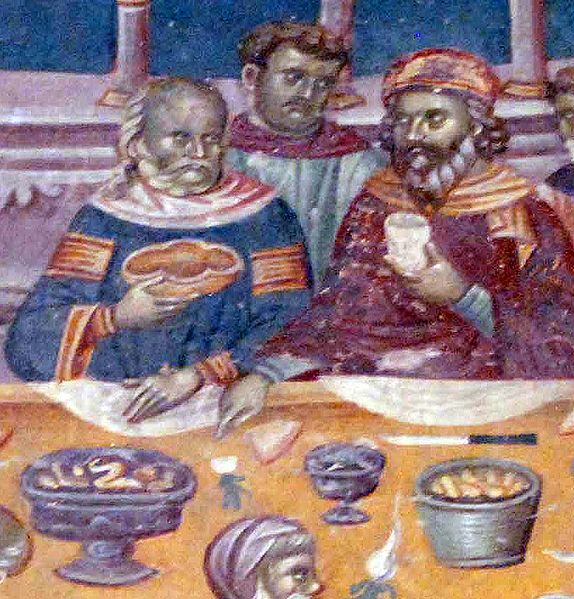
On the third day there was a wedding in Cana of Galilee, and the mother of Jesus was there. Jesus and his disciples had also been invited to the wedding. When the wine gave out, the mother of Jesus said to him, “They have no wine.” And Jesus said to her, “Woman, what concern is that to you and to me? My hour has not yet come.” His mother said to the servants, “Do whatever he tells you.” Now standing there were six stone water jars for the Jewish rites of purification, each holding twenty or thirty gallons. Jesus said to them, “Fill the jars with water.” And they filled them up to the brim. He said to them, “Now draw some out, and take it to the chief steward.” So they took it. When the steward tasted the water that had become wine, and did not know where it came from (although the servants who had drawn the water knew), the steward called the bridegroom and said to him, “Everyone serves the good wine first, and then the inferior wine after the guests have become drunk. But you have kept the good wine until now.” Jesus did this, the first of his signs, in Cana of Galilee, and revealed his glory; and his disciples believed in him. John 2, 1-11; Gospel for Sunday, January 17.
For a specifically gay reflection on the Gospel, "Gospel for Gays" is exactly what it says: a site with a particular focus on Gospel reflections by Canadian Catholic blogger Jeremiah. For this week's Gospel on the wedding at Cana, Jeremiah asks us to imagine the scene as a "gay" wedding.
[ad#In post banner]
This is not as far-fetched as it might at first appear. There is an intriguing little bit of history buried in the name of the village - "Cana". This is not the same as the "land of Canaan" we know from the Old Testament, but if it were, the idea of a miracle at the gay wedding feast would have been entirely feasible.. Canaan is one of several middle eastern lands where it is known that same sex marriages were recognized in law. (Egypt and Mesopotamia were some other examples). We must also remember that for Jesus Himself, it is highly unlikely that a same sex marriage would have bothered him in the least. We know for example, that he did not hesitate to heal the Roman centurion's "pais", or slave almost certainly used for sexual purposes, and probably with an emotional component added to the relationship; among his closest friends were the household of Martha, Mary and Lazarus, who at the very least represented a most unusual household by the strictly gendered standards of the time, but for whom the reported relationship of "sisters" may have been a euphemism for a lesbian relationship; He explicitly stated that "eunuchs" (the closest equivalent to the modern idea of "gay men") were welcome in the Kingdom of heaven. At this evening's LGBT Mass in Soho, our celebrant, Fr Sean Middleton, introduced his homily with a (jocular) reference to the "civil partnership" at Cana.
Fr Middleton also raised some important points which struck a chord with me, in connection with the reading from Paul, and the recent observations of Pope Benedict on creation and homosexuality. Recall that the reading from Paul to the Corinthians was the well-known passage on the gifts of the Holy Spirit. Listening to the words, I remembered how many psychotherapists and spiritual directors state clearly that sexuality is a gift, and that to is a gift that comes to different people in different forms - one of which is a homoerotic orientation. Elsewhere, Paul teaches that celibacy too is a gift, not given to all. Referring briefly to Benedict's claim that "homosexuality" is a threat to creation, because if the whole world were gay, humankind would become extinct, Fr Middleton pointed out that exactly the same argument applied if the whole world were to embrace celibacy (and I've never read that Benedict has condemned celibacy as a "threat to creation". )
"Out in Scripture" is an interdenominational enterprise with a full set of readings, and reflections by a team of theologians and pastors, covering all the readings of the day from the "common lectionary". For more on their methods, history and approach, see their home page. Follow this link for today's reflections. (For last week, which they confusingly label this week, go to this page)
Share your own reflections, on the readings or on the week, in the comments thread.
No comments:
Post a Comment